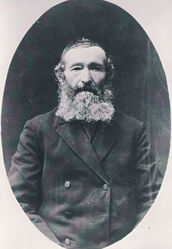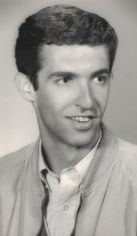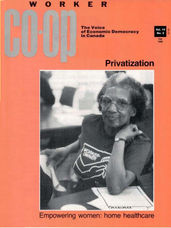


My Life and MY Work, in Brief
I came from a very unusual background: My mother died of breast cancer when I was 10 months and my dad rushed into a second marriage that proved very unhappy – for him, for me, and for my younger brother, Bob, who was born into that marriage. Possibly my most famous moment in life came in 1944, at age 2, when the Queen’s aunt, Princess Alice, visited Bellevue nursery school in Toronto, as part of her contribution to the war, and selected me for a photo op that appeared on the front page of the Toronto Telegram. I wasn’t a happy customer and was already wishing that I was not one of the chosen people.
more ABOUT ME
My school beginnings were on the rough side. Except for a psychologist armed with an IQ test, I might still be in kindergarten. However, things picked up from there, and I was only 12 when I entered Harbord Collegiate, my age being a mixed blessing as I was immature.
My family had two religions, Judaism to which was paid lip-service and was primarily a cultural activity (e.g., attending Camp Yungvelt) and Communism, which was the real thing. When other Jewish boys were preparing for their Bar Mitzvah and learning text such as Barukh ata Adonai Eloheinu, melekh ha`olam, the book I was reading started with “A spectre is haunting Europe — the spectre of communism” and ended with “The proletarians have nothing to lose but their chains. They have a world to win. Workers of the world, unite!”
In my family, Marxism was serious stuff. In the 1920s, my aunt, uncle, and cousin returned from Toronto to Moscow to be part of the revolution. (Your eyes are not playing tricks on you.) When Joe Stalin died, my grandfather was slumped over his radio, listening to the broadcast, disconsolate, with tears streaming down his face. I was 11 years old and trying to make sense of the conflicting signals from the world around me and my family.
As a young lad, these were radically different approaches, but as I matured it became apparent that they were much the same: one prophesizing a heaven after earth for adherents and the other prophesizing heaven on earth, and even more so believing that Marx, the prophet, who ironically came from a lengthy rabbinical tradition, had proven scientifically how heaven on earth would come about. Both were faith-based systems, and both were rife with dogmatism, especially if taken seriously.
My father was a heroic figure in my life, especially my formative years; he was a dress cutter and labour organizer, was critical of Stalinism, but maintained the faith as a Trotskyist. Nevertheless, there was a pragmatic side to him and in his later life he was primarily a social democrat. My dad worked long hours, attended union meetings following work, but always made time for my brother and myself. I relished our chess games. Saturday afternoon at 1 pm, it was opera time and time for me to head out, but some of it stuck, as I now enjoy the opera.
I credit Peter Russell, a brilliant young lecturer at the University of Toronto in my first course in political science with helping me to understand that there were middle ways in politics and not everything need be reduced to extremes. (Peter would later become a leading scholar of the Canadian constitution and the Canadian parliamentary system.) I was searching, needing ideals, and was a bit unhinged. The study of psychology, Freud and Fromm at first, became an escape, and I completed an MA in Social Psychology at the U of Toronto, after turning down an offer from the U of Toronto Law School. I did my PhD at OISE, U of Toronto, with a thesis on the student movement of the 60s, which was published as a book in 1972, the year that my daughter, Zoey, was born.
However, I was still searching. I had a yen, a human yearning to see a better way. In 1980, I had a sabbatical from my faculty position at OISE, and with my family (my wife Jesse at the time, Zoey, and my 2-year old son David) took the unusual step of living on a kibbutz, a utopian communal system in Israel that I had studied and wanted to learn more about. It also gave me a chance to introduce my children to a secular form of Judaism, apart from religious worship. This was a life-changing experience for me as I was introduced to a form of co-operative that seemed to work and offered its members a good standard of living and a good quality of life. It also gave me and my family an opportunity to experience Judaism as a living culture without all the religious baggage.
My skepticism about religion was reinforced when I asked my Aunt Sophie, before departing, to teach me some Hebrew, as she went to synagogue to pray every morning. To my shock, she said that she knew none; she didn’t understand what she was praying, perhaps for the better too.
One of the most astonishing observations for me when we arrived at the kibbutz was the restlessness of the younger generation. While the founders believed that they had created heaven on earth, their children were searching for change, and in doing so were encouraged by their elders who urged them to travel and see the rest of the world, believing that they would return because the kibbutz was such a superior society. I wrote several papers on the topic, including “Intergenerational discontinuity in the Israeli kibbutz.” The kibbutz was an open society with an educational system that emphasized individual choice, and it resulted in fundamental changes to its communal structure, something that we later wrote about in our book, Crisis in the Israeli Kibbutz, edited with my dear colleagues and friends, Uri Leviatan and Hugh Oliver (Praeger, 1998).
One observation that stuck with me from our stay at Kibbutz Ein Hamifratz was when the assembly line for their huge agricultural carton factory broke down, the workers would rush to fix it. I had worked on assembly lines during summer jobs, and when the line broke, the religious among the group would look skyward and offer a large thank you. No-one rushed to fix it. I felt that I was witnessing a new model of work, and, when we returned to Toronto, I immersed myself in the study of co-operatives and particularly worker co-operatives, firms that were owned in common and democratically managed by their employees.
I ceased to be unhinged, started editing a newsletter (to become a magazine) called Worker Co-op, joined a learned society called the Canadian Association for the Study of Co-operation, led several educational studies sponsored by the now-defunct Co-operative College of Canada, designed to encourage the use of educational modules about co-operatives in the schools, and became a passionate advocate of democratic forms of work arrangements, particularly the worker co-op. In 1985, together with Wilf Bean and others, we produced the handbook, Starting a worker co-operative, published by the Worker Ownership Development Foundation. In 1991, I helped to organize the Canadian Worker Co-operative Federation, an umbrella organization that continues to lobby on behalf of worker co-operatives and helps to organize them.
My interests were not simply about democratic forms of work management, but also about how wealth could be distributed more equitably, not only using government policies but also through firms, pensions, and union initiatives. Among my writings on this topic were the following:
Quarter, J., & Melnyk, G. (Eds.) (1989). Partners in enterprise: Worker–ownership in Canada. Montreal: Black Rose.
Quarter, J. (1995). Crossing the line: Unionized employee ownership and investment funds. Toronto: Lorimer.
Quarter, J. (2000). Beyond the bottom line: Socially innovative business owners. Westport Conn.: Greenwood/Quorum.
Carmichael, I., & Quarter, J. (Eds.) (2003). Money on the line: Workers' capital in Canada. Ottawa: Canadian Centre for Policy Alternatives.
Quarter, J., Carmichael, I., & Ryan, S. (2008). Pensions at work: Socially responsible investment of union-based pension funds. Toronto: University of Toronto Press.
My interests gradually broadened out and I began to see co-operatives as part of a broader social sector – the social economy. As I studied more, I became astonished at how broad Canada’s social economy was and that co-operatives were such a small piece of it. The beginning of this work was my 1992 book, Canada's social economy: Co-operatives, non-profits and other community enterprises. Toronto: Lorimer. The book was the first comprehensive portrait of Canada’s social sector. I have continued with this line of work, with colleagues Laurie Mook, Ann Armstrong, and John Whitman, and produced a series of books, journal papers and chapters, much of it sponsored by large grants from the Social Sciences and Humanities Research Council of Canada. The books, in particular, include:
Quarter, J., Mook, L., & Armstrong, A. (2009). Understanding the Social Economy: A Canadian Perspective. Toronto: University of Toronto Press.
Mook, L., Quarter, J., Ryan, S. (Eds.). (2010). Researching the social economy. Toronto: University of Toronto Press.
Mook, L., Quarter, J., Ryan, S. (Eds.). (2012). Businesses with a difference: Balancing the economic and social. Toronto: University of Toronto Press.
Quarter, J., Ryan, S., & Chan, A. (Eds.). (2015). Social Purpose Enterprises: Case Studies for Social Change. Toronto: University of Toronto Press.
Mook, L., Whitman, J., Quarter, J., & Armstrong, A. (2015). Understanding the social economy of the United States. Toronto: University of Toronto Press.
Quarter, J., Mook, L. & Armstrong, A. (2018). Understanding the Social Economy: A Canadian Perspective (2nd Edition). Toronto: University of Toronto Press.
A consistent theme running through this work is that our economy is mixed, and within that the organizations in the social economy interact with the private and public sectors in differing ways. We used a Venn diagram to portray these differing interactions.
Some secondary themes sprang from this research. A strong interest in volunteering and how to measure it, led by my colleague, Laurie Mook of Arizona State University:
Quarter, J., Mook, L., & Richmond, B. J. (2003). What counts: Social accounting for non–profits and co-operatives. Upper Saddle River, New Jersey: Prentice Hall.
Mook, L., Quarter, J., & Richmond, B. J. (2007). What counts: Social accounting for non–profits and co-operatives (2nd Edition). London, U.K.: Sigel Press.
One of the greatest pleasures in my work is sharing with past and current students. I have been blessed by the students who have found me, and they have greatly enriched my life. Many now teach at universities in Canada and the US. I have been fortunate.
I have enjoyed leading teams, large teams of researchers, spurred by grants, primarily from SSHRC, about $7.2 million over the years. In 2008, we formed the Association for Nonprofit and Social Economy Research (ANSER), a pan-Canadian network of researchers from universities and community organizations that participates in Congress for Humanities and Social Sciences each year and has about 100 members. I was the founding president and did that until 2014. I was pleased to receive the ANSER Distinguished Service Award in 2015 in recognition of my contribution.
A common denominator in my work is faith in a better way, possibly a form of religious belief, but one that gives my life’s work meaning. One of my struggles in life and in my work has been to maintain a balance between idealism and pragmatism. To this I credit my beloved partner of 32 years, Dale Willows, who has modelled for me how this could be done. We share many of the same ideals, but she has helped me to stay balanced and carefully consider evidence before formulating opinions. Part of my motivation for doing this is to try and model that balance for my beloved son, David, of whom I am very proud.
My life has been about much more than work. I have derived immense pleasure from riding my bicycle throughout the Galloping Goose Trail of Vancouver Island; I enjoy losing myself in a bridge game, usually on Sunday evenings, sadly having lost my bridge partner and long-time friend, Hugh Oliver. I can lose myself in a good book, particularly political biographies; enjoy music of all sorts, with a special nod to Leonard Cohen, perhaps because like me he sings off key. I have been blessed with a loving family and a strong circle of friends.
I write this at age 77, struggling with advanced stomach cancer, and an uncertain future. Like most people I have some regrets: not knowing my mother; my daughter’s death at age 34, also from breast cancer; not having children with Dale Willows. I dabbled with creative writing at various points, writing a play that the BBC put on in 1979, Reflections of a Well-Conditioned Madman. I would have liked to publish that great novel, but never did. Nevertheless, I have been very fortunate in my life – personal and work – and hope that I have contributed in some small way. In spite of the many problems in this world, I remain hopeful that people will find a better way.
Jack Quarter
January 2019

























































































